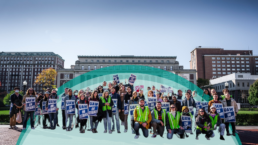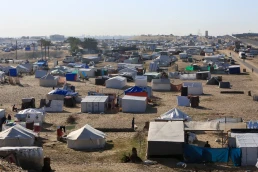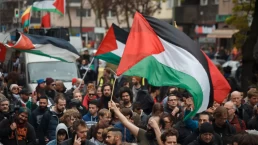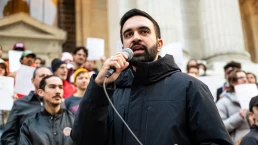While the administration adopts increasingly harsh (and likely illegal) measures to break the strike, student workers stand strong on the picket line.
By Sam Rosenthal
Columbia University, an Ivy League university with a $14 billion endowment, says it will start firing striking student workers at the end of the week. A few days ago, student workers at Columbia University received an alarming email from Daniel Driscoll, the Vice President at Columbia University Human Resources. The email, ostensibly a procedural update on graduate student teaching assignments for the spring semester, wasted little time in getting to the punch line: “Please note,” Driscoll wrote, “that striking student officers who return to work after December 10, 2021 will be appointed/assigned to suitable positions if available.” [emphasis added].
The message was clear: graduate students who continued to strike now ran the risk of being shut out of teaching assignments and, by extension, their livelihoods in the spring semester.
Administration Increases Strikebreaking Efforts
Driscoll’s email was just the latest in a series of increasingly punitive attempts by Columbia University’s administration to break Student Workers of Columbia (SWC)’s six week-long strike. The SWC-United Auto Workers Local 2110 union, has been out on strike since November 3rd. It is the second strike by the union in the last year; the SWC-UAW last went out on strike during the 2021 spring semester. A tentative agreement, reached last spring by the union’s bargaining committee, was voted down by membership, which precipitated the resignation of the bargaining committee members.
The SWC-UAW’s demands are similar to those made in the spring semester: they are asking for a living wage for student workers, better healthcare that includes dental and optical care, and more robust protections against workplace bullying and sexual harassment. Further, students are decrying a change to the university’s pay schedule, made over the summer, that opts to pay student workers via regular stipends instead of in lump payments. This change, students say, has forced them to take on extra debt to pay for sizable upfront costs associated with the beginning of the semester.

Student Workers Really Are Workers
The impasse between the administration and student workers largely revolves around fundamental questions about how student workers’ labor is viewed by the university versus the workers themselves. This debate is also the basis for a long running dispute at the National Labor Relations Board (NLRB) over the status of student workers. A 2016 decision, based on a complaint brought by the UAW on behalf of Columbia University student workers, overturned a prior determination that student workers were not employees; this opened the door to the formation of graduate student unions. However, this decision was subsequently threatened by a cadre of anti-labor Trump-era appointees to the NLRB, who proposed a rule that would have effectively overturned the 2016 determination. Then, early this year, the 2016 decision was reaffirmed, bolstering the organizing efforts of student workers.
For student workers, though, these theoretical/legal debates have immediate material impacts. “There are basic philosophical differences about how to arrive at fair compensation,” said Jesse Chevan, a doctoral student in Columbia’s music department. “The university is saying, ‘We compensate you fairly because what we’re offering is competitive against other top tier universities.’ But we’re saying, if you compare [compensation] against the cost of living in New York, it’s below the standard for a living wage.”
Columbia University and the SWC-UAW have been in mediation since around November 22nd. However, Driscoll’s email to student workers has been perceived as an ultimatum, prompting a new flurry of strike actions by the union. In an open letter, the SWC-UAW wrote that Driscoll’s threat constituted an illegal attempt to permanently replace striking students’ labor, per NLRB regulations. “Threatening to permanently replace striking workers’ labor during a ULP [unfair labor practices] strike on top of their existing financial hardships is unacceptable,” they wrote. Today, December 8, the SWC-UAW has called for a day of action to protest the administration’s hardball tactics.
Amid a wave of student worker strikes over the last several years, Columbia’s student workers have reason to be optimistic. Striking workers at Harvard, for example, just won a five-year contract that included salary raises, third-party arbitration for most harassment claims, and access to a legal expense fund. Last spring, NYU’s graduate student workers won similar concessions from the university, substantially increasing their wages and health care coverage.
But, with Columbia’s administration clearly still searching for a knockout blow, SWC-UAW members may be in for a long fight.
The Student Workers of Columbia have set up a strike fund here. You can also follow recent developments on their website or Twitter.
Recent Posts
Stop Israel’s Dystopian “Humanitarian City” Plan—Before It’s Too Late
July 11, 2025
Take Action Now For the past 20 months, the world has watched—and largely enabled—a genocidal campaign in Gaza. Over 55,000 Palestinians have been…
The “Liberal” International Order Is Criminalizing Palestine Protests
July 11, 2025
Take Action Now As Western governments repress Palestine solidarity and enable Israel’s impunity, the “liberal international order” is no longer…
Politicians Are Betraying Gen Z On Climate
July 10, 2025
Take Action Now While Gen-Zers thrift, knit, crochet, and find other ways to reduce our footprints, Trump and the GOP are greenlighting more climate…
Trump’s Deportation Threat Against Zohran Mamdani Is Shameful
July 10, 2025
Take Action Now In only half a year of Donald Trump’s presidency, he and his allies have turned deportation into an explicitly political threat…




